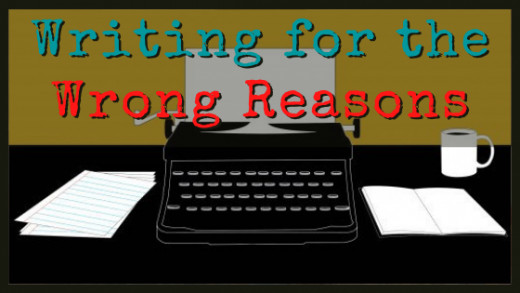Writing for the Wrong Reasons

Why Do You Write?
Writers are told to write about anything, anytime, as much as possible. This is great advice…to a point. What happens, though, when a writer’s intentions become skewed? Certain motivations and situations can lead them down the wrong path and actually inhibit their writing. Below are five ways to avoid writing for the wrong reasons.
Writing For Money

Writing For Money
All writers would like to be compensated for their work. I admit that my ultimate goal is to be able to support myself primarily through my writing.
It’s a very respected and encouraged goal for all writers to have. You never know when that could lead to a well-paying job. However, when money becomes the primary motivation for writing, it can lead to a rushed product that is poor in quality and not worthy of whatever monetary value it brings, no matter how small.
When I first started writing professionally, I joined a few blogging sites in order to try to earn some money between semesters of college during the summer. I’ve had my eye on a writing career ever since I was a kid. However, this particular summer, I really wanted to see some return for the words that I typically just scribbled into my notebook and showed to a few people.
I thought that writing news blogs could really help to satisfy this need to earn some cash. Instead, I should have used the time to find an internship and try to gain more real-world experience with my writing.
The first site I joined was The Blogger News Network, and I made about $100 in three months. I wrote one to three blogs a day and even signed up as a reviewer where I received free copies of books and movies to review.
Considering these free copies as a form of payment, I took my time and really tried to make these pieces the best that they could be. However, the daily news blogs that I wrote were pure facts taken from my sources with little analysis or thought put into them. I did it solely for the motivation of receiving a meager PayPal deposit at the end of the month.
Next, I joined, Suite 101, and it was more of the same. This site paid their writers based on how well the site did each month. They also had a small, 300 word minimum blog, and I chose topics that were so limited in their content that I would struggle to hit the 300 word mark.
The few people who commented on my pieces would accuse me of being too factual and boring in my writing, spouting fact after fact like a school report, and they were right. I was just looking to publish as many articles as I could in order to make as much money as possible. I learned nothing from these two blogging experiences besides to never let money fuel your desire to write.
Ed Wood's Misplaced Confidence

Writing for Fame
I cannot personally speak for this motivation. I am not famous. I will probably never be famous. Maybe writers looking for fame are confusing celebrity for admiration. I’m sure that Stephen King loves to be told how much his books mean to his fans, but I doubt he appreciates the occasional stalker who lurks outside his home.
Writers should not be attention hogs. We create characters for that. We work behind the scenes as an omniscient presence in the worlds that we create.
There are plenty of other professions that will allow the attention seekers to take center stage. Very few authors are recognized by their face, or even their names. This will be a frustrating distraction to anyone who is looking to become well known. Make sure it’s your words that you want in the spotlight, not yourself.
Driving Yourself Mad Trying to Write When You Can't

Writing Because You Think You Have To
I spent many years writing everyday because I thought that’s what I had to do. I was so afraid to stop because I worried that I might not start again or that I would waste my time with less productive activities. I wrote when I was sick. I wrote on holidays.
I would feel like a failure if I didn’t hit a specific word count or would go back and realize that this was a piece that was going nowhere or was something that wouldn't be worth my time to finish. Every minute of my writing time had to count, and as a result, I burned out.
Now, when I need a break, I take a day off. Most of the time, if I say, “I’m not going to write today,” I end up writing something anyway, and that bonus writing is often something usable because it isn’t forced work. It clears your mind and allows you to write whatever you want, as much as you want, and it’s enough.
I also have found that if I’m not writing, I’m doing something else that I like to do, like drawing or spending time with friends and family, giving me time to think and letting real life lead to inspiration. Leave the deadlines and stress for when you actually have some professional work to submit, and don't be afraid to put the writing aside for experiences that could lead to a great piece of writing later.
Trolls

Writing to Be Negative and Spiteful
It’s sad the amount of nasty comments that you see online nowadays. The price of the Internet’s soapbox format is that people can typically say whatever they want, and when they are not standing face to face with their victim, they tend to unleash in the boldest and meanest ways possible.
If your writing time is comprised of mainly putting down, correcting, and insulting others, that may not be the best use of your time. Disagreements will happen, and personal ideologies will be tested, but the spiteful, profanity-laced comments and responses that you can encounter while trying to read something entertaining or thought provoking can become tiresome and does little to impress or persuade.
Ghost Writing

Writing for Someone Else
If you’re the known writer in your social circle or family, chances are, you’ve been asked to comprise a piece for someone else, whether it be writing a research paper for a class, jotting down something meaningful in a birthday card, or composing a persuasive piece for something with which you have no connection. I am guilty of writing all of the above for other people.
It can be a soul sucking and thankless task, and unless you’re aiding in a recommendation and putting your name on the work, you probably shouldn’t do it. You're limited to writing in a disguised voice, tailoring the piece to make it fit the tone and talents of the person you are helping, and basically fooling your intended reader(s).
You should be no closer to the piece than peering over the shoulder of the person you are assisting, helping to piece words together, offer correct word spellings, and utilize your knowledge of language and writing mechanics. The ideas, handwriting (if applicable), and basic structure, however, should belong to that other person.
There’s nothing wrong with helping someone out. But writing the whole thing and then passing it off as someone else’s is just not helpful to you or to anyone else.
When have you written something for the wrong reason? Share your stories in the comments below!








